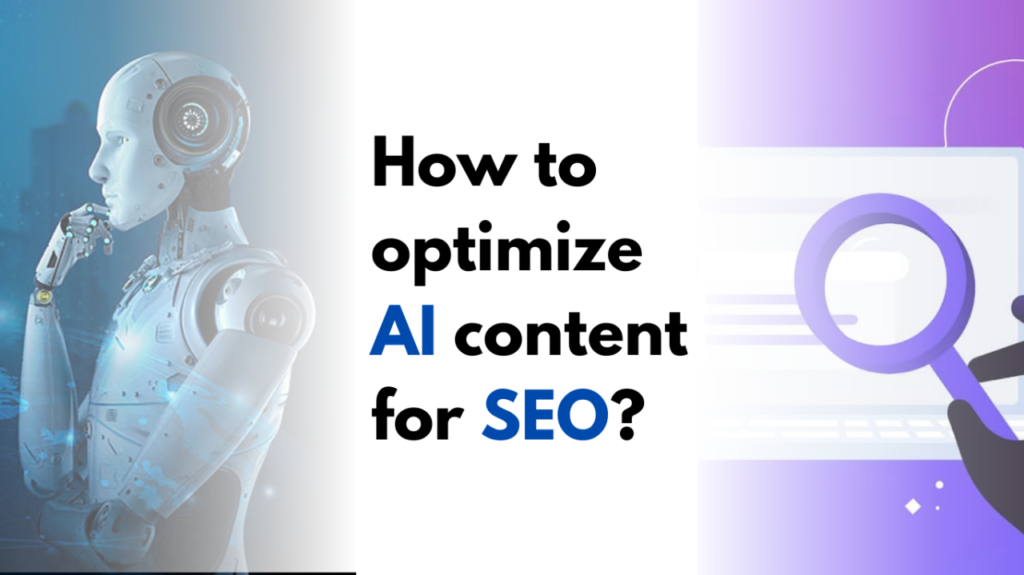Optimizing AI-Powered Content for SEO Success
AI content creation is a powerful tool for boosting your content marketing strategy. But while AI can churn out vast amounts of text, SEO optimization requires a human touch. This article will guide you through effective strategies to optimize your AI-generated content for search engines and user engagement.
Here’s a comprehensive article on how to optimize AI-generated content for SEO. As artificial intelligence (AI) becomes increasingly integrated into content creation, understanding how to leverage it effectively for search engine optimization (SEO) is crucial. Let’s dive into the strategies and tools you can use to enhance your AI content’s visibility in search results.
1. Understanding AI SEO
Before we delve into optimization techniques, let’s clarify what AI SEO entails. AI SEO refers to using artificial intelligence to enhance a website or webpage’s organic performance. By analyzing data and automating certain tasks, AI can help improve your content’s chances of ranking higher in search engine results pages (SERPs).
Leveraging AI for SEO Benefits
AI offers several advantages for SEO:
- Topic Brainstorming: AI can analyze search trends and user queries, suggesting relevant topics to target.
- Keyword Research: AI tools can identify high-performing keywords and related terms to optimize your content.
Content Optimization: AI can analyze existing content, suggesting improvements in keyword integration, readability, and structure.
https://www.linkedin.com/embeds/publishingEmbed.html?articleId=7759713133876962036&li_theme=light
2. AI SEO Tools for Optimization
Here are some powerful AI tools that can assist you in optimizing your content for better SEO:
a. Jasper
- Description: Jasper is an AI writing assistant that generates SEO-optimized blog posts, emails, and other marketing materials.
- How It Works:Provide seed words and specify the desired tone of voice.Jasper analyzes the information and creates phrases, paragraphs, or complete posts.
- Additional Features:Auto-save functionality.Plagiarism checker.Brand voice customization.Multi-user login.
b. AlliAI
- Description: AlliAI streamlines website optimization for SERPs.
- Key Features:Bulk Onpage Optimization:Creates site-wide optimization rules.Deploys code changes to individual pages.Live Editor:Edits and optimizes text, content, and code within your pages.Self-Optimizer for Traffic ROI:Generates sitewide page titles with real-time focus keyword A/B testing.
c. SEO.ai
- Description: SEO.ai leverages AI to expedite content creation and optimization.
- Features:Generates entire blog posts, including formatting, bullet points, and pull quotes.Conducts advanced keyword research.Provides real-time feedback for optimizing your content.
3. Strategies for Effective AI Content Optimization
Here are three strategies to ensure successful AI content optimization:
a. Manual Content Optimization
- Process:Review AI-generated content using a checklist.Fine-tune the content based on your SEO goals.Pay attention to readability, keyword usage, and relevance.
b. Tool-Assisted Optimization
- Process:Use an SEO tool that provides real-time feedback.Optimize your content based on the tool’s recommendations.Focus on factors like keyword density, meta tags, and internal linking.
c. User Intent Optimization
- Process:Conduct thorough keyword research to target relevant terms.Craft compelling headlines and meta descriptions that accurately reflect user expectations.Prioritize user intent over keyword stuffing.
Building a Winning SEO Strategy for AI Content
Here’s a roadmap to optimize your AI-generated content for SEO:
- Target the Right Keywords:
- Conduct keyword research to identify relevant terms with high search volume and low competition.
- AI tools can assist in this process, but finalize your choices based on strategic judgment.
- Focus on User Intent:
- Search engines prioritize content that fulfills user intent. AI can help analyze user queries, but ensure your content comprehensively addresses the user’s search goals.
- Maintain Human Oversight:
- AI-generated content can lack the originality and depth human writers provide.
- Fact-check information, edit for clarity and flow, and infuse your brand voice.
- Prioritize Readability and Structure:
- Use clear, concise language and break up text with headings, subheadings, and bullet points.
- AI can suggest improvements, but human editors ensure a reader-friendly experience.
- Optimize On-Page SEO:
- Integrate your target keywords naturally into titles, meta descriptions, headers, and throughout the content.
- Ensure proper image optimization with relevant alt text.
- Integrate Multimedia Content:
- Search engines favor content that incorporates various media formats like images, infographics, and videos.
- AI can’t replace human creativity in crafting engaging multimedia elements.
- Don’t Neglect Off-Page SEO:
- SEO success hinges on building backlinks from high-authority websites.
- While AI can’t generate backlinks for you, focus on creating high-quality content that naturally attracts backlinks.
- Embrace Continuous Improvement:Regularly monitor your content’s SEO performance using analytics tools.Refine your AI-powered content creation strategy based on data and user feedback.
The Future of SEO and AI
AI is a powerful SEO ally, but it should complement, not replace, human expertise. By combining AI’s data-driven insights with human creativity and editorial oversight, you can create high-performing content that ranks well in search results and resonates with your target audience.

